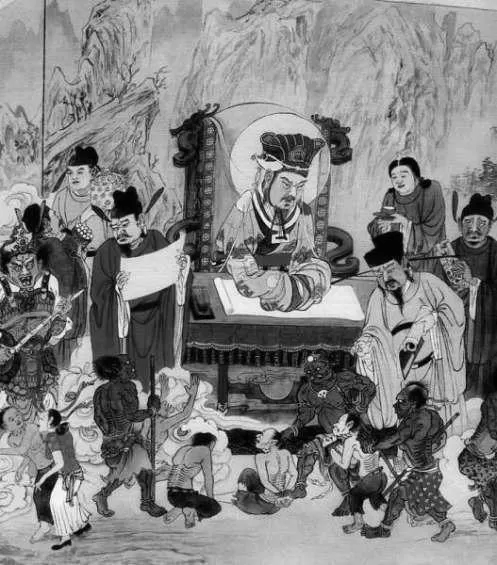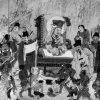The Chinese deity of death and rebirth, Yanluo Wang, is often associated with the Buddhist God Yama but has his own set of stories. He is the underworld judge and has long been worshipped in China. Usually appearing in a male form, Yan has many minions. These include the judge with a book and brush and Ox-Head and Horse-Face, who bring newly dead souls before Yan. If the deceased souls have merit, they are rewarded with a beautiful future life and sometimes a revival in the previous life.
Yan Wang
Yan Wang is the King of Hell in Chinese mythology and is the God of death and rebirth. He rules over the underworld, which is composed of ten layers. He sits in the underworld as a judge and determines the fate of the dead. As a result, Yan Wang is considered one of the most feared gods in Chinese belief.
Yan Wang is not immune to Hell’s punishments, however. His punishments depended on the crimes committed during his life, with virtuous souls sent to Heaven and the sinning ones reborn as human beings and exiting the cycle of rebirth. On the other hand, the sinful souls are questioned by Yan Wang and sentenced to wander in Hell.
Throughout Asia, Yan Wang has become a popular death deity. He has also appeared in popular culture. The character King Yemma in the Dragon Ball Z series and King Enma in Yokai Watch is based on the deity. His fearsome appearance has caused him to be portrayed as a terrifying, fierce being.
Yan Wang is one of the principal deities of death and rebirth in Chinese mythology. His name means King Yan and is the most popular Chinese name for the deity. In addition to his many words, Yan Wang is a common surname. Chinese gods often choose burial by inhumation, but there are other burial methods, including cliff burial, tree burial, or water burial.
Yan Wang originally appeared as a Hindu god named Yamaraja. Stories about him eventually made their way to East Asia, where they adapted to Chinese culture. The deity’s role as Lord of the Dead was maintained in the Han-Chinese culture, but the deity’s appearance was changed to fit in with the dominant Han-Chinese culture.
In Chinese mythology, death gods are revered as the underworld rulers. Although they are not considered supreme gods, they report to the Court of Heaven, the highest divine authority in Chinese belief.
Diyu
The Chinese deity of death and rebirth is Diyu. He is a vengeful god who rules the land of the dead and is often called Hell in Chinese mythology. The land of the deceased is said to contain a maze of torture chambers. The Chinese deity has ten “Courts of Hell,” each ruled by a Yama King.
According to traditional Chinese belief, the Diyu is an underground maze where the souls of the dead are sent after death. They pass through it to atone for their sins. However, the number of levels in the Diyu varies among Taoist and Buddhist traditions. Buddhists believe there are three to four levels of Hell, while Taoists think there are ten courts. In actuality, there are eighteen levels in Diyu.
Regardless of whether the death of a person is eternal or temporary, a process of punishment awaits the dead. The penalties will vary depending on the severity of a person’s sins. For example, an individual who sinned in the past may spend eternity in Diyu. If they repent, they may return to the Earth in a new body.
Death is a necessary part of life but a painful experience. People who commit crimes will end up in Diyu, where they will be punished harshly. In addition to harsh punishment, they will face another life of misery.
Chinese beliefs about Yan have spread to Japan, Korea, and Vietnam. In Japan, the spirit of Diyu is known as Enma, King Enma, and Great King Emma. In Korea, he is called Yeoman or Yoma Deewana. In Vietnam, he is known as Diem Vuong. The Vietnamese revere him as the council of ten kings.
According to the Chinese deity of death and rebirth – Diyu, the Chinese God of death and reincarnation – there is a third realm where the soul of the dead is sent after they die. In this realm, the soul is judged based on its previous actions in life.
Yanluo Wang
The Chinese deity of death and rebirth, Yanluo Wang, oversees punishment. In some traditions, the dead’s spirits are punished in the nether world and are brought back to Earth in a new body. According to the Chinese version, however, both locations are temporary, and the souls of the dead eventually return to the Earth in a new body. The deity is also invoked as an exemplary figure.
According to Chinese mythology, the soul, after death, goes to the Diyu and is judged based on the severity of the crime committed. The virtuous souls are sent to Heaven, while the sinful souls are condemned to wander in Hell.
The Three Stars also represent the top three traditional qualities of a good life. They are often depicted as a trio, or as a group, in paintings, statues, and ornaments. Some depictions of the Three Stars feature children, while others feature an older man with a walking stick and a peach of immortality. Most Chinese have at least one statue of the Three Stars in their homes and workplaces.
Chinese Gods of Hell are the most feared of all. Although Chinese people rarely carry amulets of the deities, they are said to be so frightening that meeting them could end in eternal misery. Unlike the Western concept of a “King of Hell,” the Chinese Gods of Hell are not demons or evil spirits.
As a result of this fear, Chinese believers often pray to Wudao. He is often mentioned in funeral passports and votive objects. Many believe that he can guide the dead through the afterlife. In some cases, he is even invoked during exorcisms as a protector for the dead.
The God Pangu is the first living being in Chinese cosmology. He appears in many myths as a giant with horns. His role in creating the universe was to separate yin from yang and push the sky upwards to keep them separate.
Diem Vuong
The Chinese deity of death and rebirth, Diem Vuong, is also known as Yan. He originated in China and later spread to Korea and Japan. In Japan, he is known as King Enma and Great King Enma; in Korea, he is called Yeoman or Great King Yeoman. Diem Vuong is worshipped as the underworld deity, dia us in Vietnam.
A funeral ritual begins with a third recitation of the requiem. After the lament is recited, the dignitary carries nine incense sticks. The number nine is the highest and refers to the number of Master Cao Dai. The incense sticks are then lit at the same level as the deceased’s body, and the ashes are used to draw the talisman.
The Vietnamese word for death, “chet,” can mean “soul” or “true spirit.” Some people worship Diem Vuong and call him “the Jade Emperor.” It is said that he can grant you this spiritual light. Those who worship Diem Vuong have a deep spiritual connection to him, and the soul’s rebirth is the practice’s ultimate goal.
After death, the spirits of the dead go to the nether world to experience punishment, but this is not permanent. The hearts go back to Earth in a new body. This belief is derived from Indian texts and local culture. There are many versions of the hells, and Chinese traditions propose two rival versions.
Chinese funeral rituals include the Cao Dai prayer, which aims to have the dead’s left eye open. This is considered a sign of salvation and election. The Cao Dai prayer also seeks to help the dead soul recover from Master Cao Dai.
A memorial altar is often set up in front of the coffin. There, the family members place sacrificial offerings and a memorial tablet. The monument tablet consists of an image of the deceased’s face.







